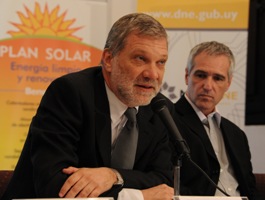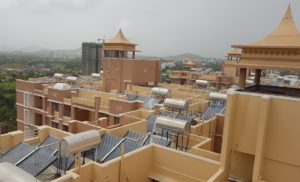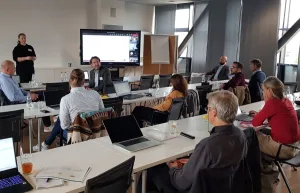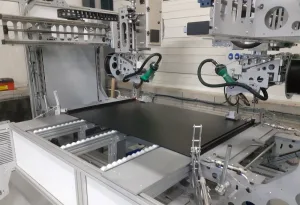

Uruguay: Solar Plan Includes Grants and Low-interest Loans for Households
The Government of the Republic of Uruguay aims at reaching a renewable share of 50 % in its national energy mix in 2015. The new Decreto N 451/011, which was implemented on 19 December 2011, marks an important step in this direction (see the attached document). The regulation refers to Solar Thermal Law 18585 (Ley Solar Tèrmica 18585), which was approved by the parliament on 18 September 2009. The new Decreto mandates a 50 % solar share for hot water generation in hospitals, hotels and sports clubs – for both newly built and soon-to-be-renovated houses. On 22 March 2012, the Minister of Industry, Energy and Mining, Roberto Kreimerman (see photo left), also launched a Solar Plan, which is hoped to increase the use of solar thermal collectors in private homes.
Source: Presidencia de la República Oriental del Uruguay
The Ministry of Industry, Energy and Mining came up with the Solar Plan in order to more effectively campaign for the use of solar water heaters and facilitate financing of the technology in the residential sector. With the new approach, the government hopes to save electricity, which has, so far, been the most widespread source for heating water in the house. The country’s electricity distribution network is managed by state-run utility company UTE. Of a total of 1.2 million households, 130,000 homes are thought to be serviced in this first phase. This means that the ministry is planning a lot of activities.
UTE reduces the energy bill of any end consumer which purchases a solar water heater by a monthly Uruguayan Peso (UYU) 350 over the first 12 months. This corresponds to an investment subsidy of around 11 % for a simple system kit, which costs around UYU 37,000 (EUR 1,600), including installation, 5-year insurance, taxes, etc. Package prices can go up to UYU 47,000 (EUR 2,000), depending on the chosen equipment and how complicated the installation is. The 5-year insurance is granted by a public bank named Banco de Seguros del Estado (State Insurance Bank).
All clients have also access to a low-interest loan by public bank Banco Hipotecario del Uruguay (BHU). Loans range between UYU 40,000 and up to UYU 270,000 (EUR 1,700 to 9,000). They will be easy to get without a mortgage and only one signature. As an interest rate, the bank will charge the lowest rate usually reserved for a “non-warranty requiring loan”. The client needs to have a fixed salary over the last 6 months or a pension.
In addition, the National Energy Administration (DNE) is about to set up a list of solar equipment companies and technicians which have fulfilled the technical requirements (see below). And last but not least, there are plans for a comprehensive TV advertising campaign in order to encourage people to buy solar heaters. The campaign should start after the winter time 2011/2012, as soon as there are more eligible equipment providers.
The manual of the Solar Plan, which was published in March 2012 as well, includes a fair number of technical and quality requirements to ensure a good solar water heater performance (see the attached document). Among them are:
- It is mandatory to use pre-fabricated solar systems
- Auxiliary heating, such as an electric element included in the solar system, is not allowed.
- Thermosiphon systems are eligible with a closed solar loop only.
- Minimum aperture area: 1.5 m2; minimum storage volume: 120 litres
- Ratio between tank volume to collector area must be between 60 and 120 litres/m2
- 6 bar is the maximum pressure; water-filled double-glass vacuum tubes are not eligible, but vacuum tubes with heat pipes are admitted.
- Automatic mixing valve temperature must be below 60 °C
- Tempered glass cover and a metallic absorber are mandatory
The government in Uruguay has decided to enter a new level of solar energy use. One has to wait and see how the public will react to the presented opportunities.
This news was written by Eliseo Cabrera, Architect from Uruguay (eliseocabrera (@) uni.ort.edu.uy) and Professor at the Architectural Department of the Universidad ORT URUGUAY, in cooperation with Carlos Faria Café, Studio Director of SE – Studio Equinócio – Marca Solar Group, based in Brazil (coffee (@) studioequinocio.com.br).
More information:
UTE: http://www.ute.com.uy
DNE: http://www.energiasolar.gub.uy
BHU: http://www.bhu.com.uy
Camara Solar del Uruguay: http://www.camarasolardeluruguay.com.uy/press.html


